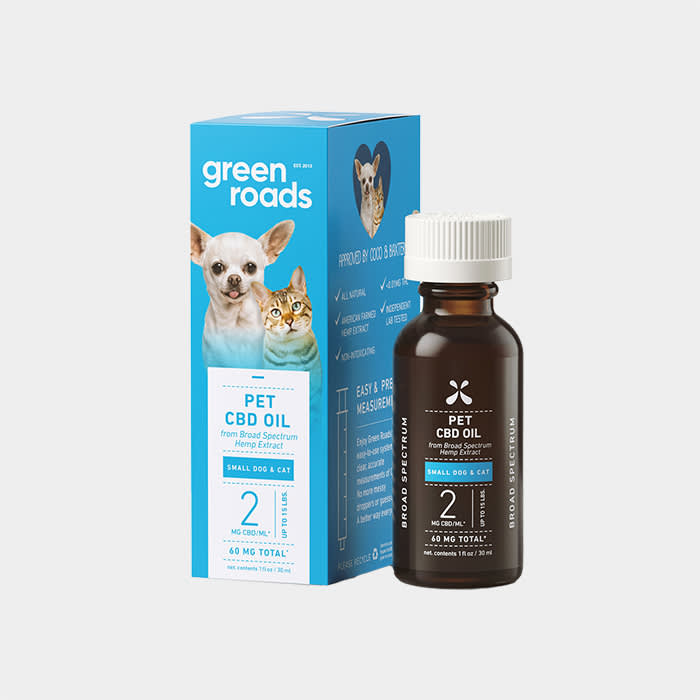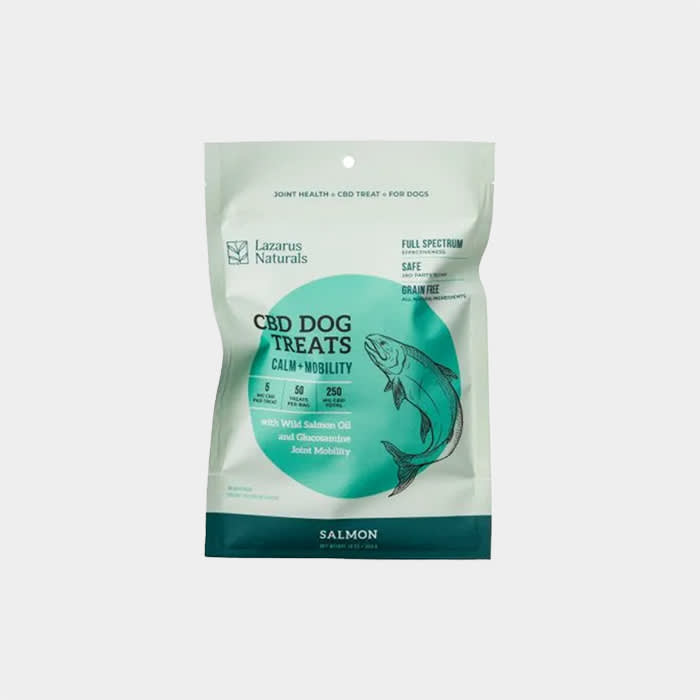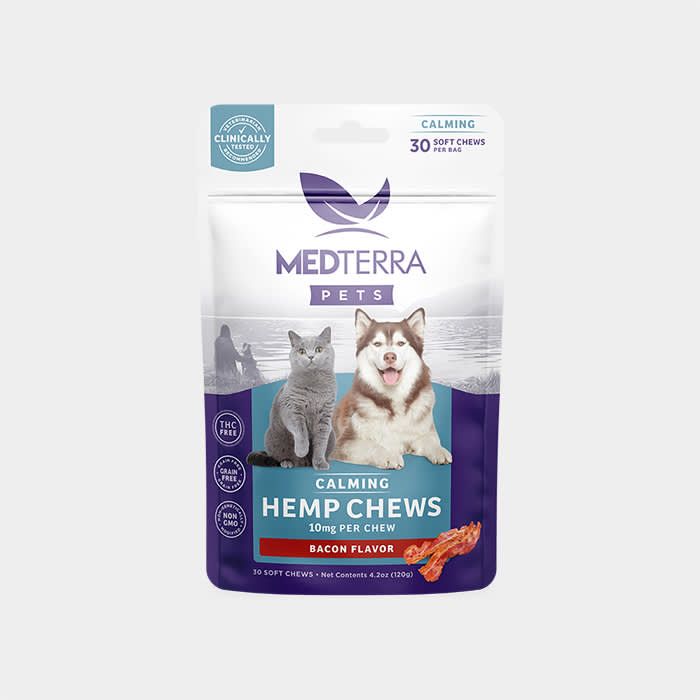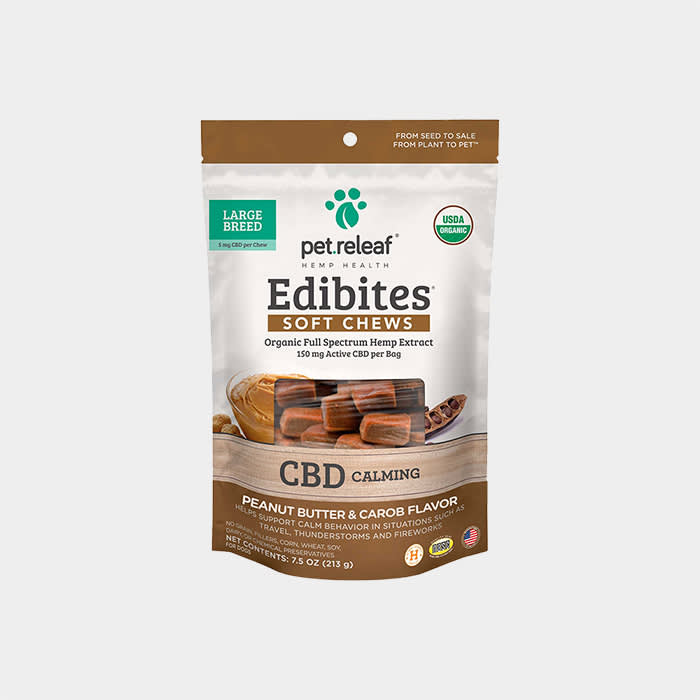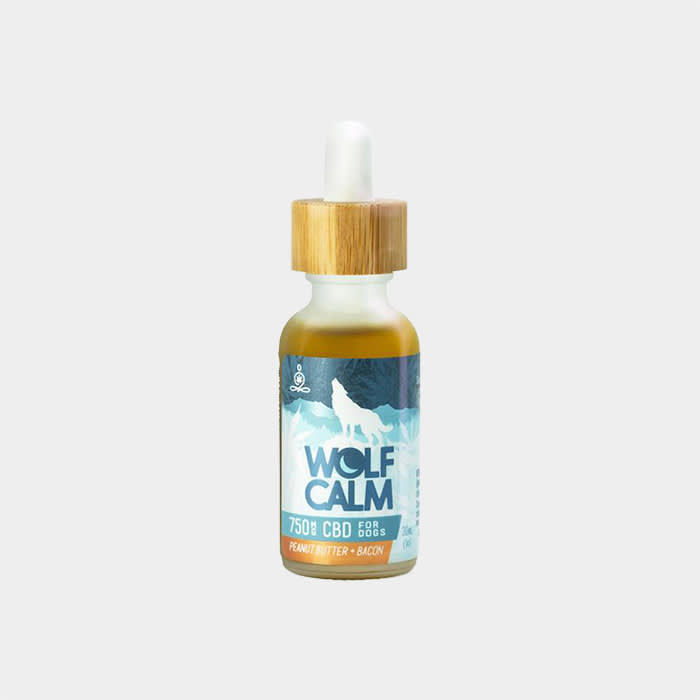Does Your Pet Want in On Your CBD?
6 of the best pet CBD products on the market — if it’s the right choice for your pet.
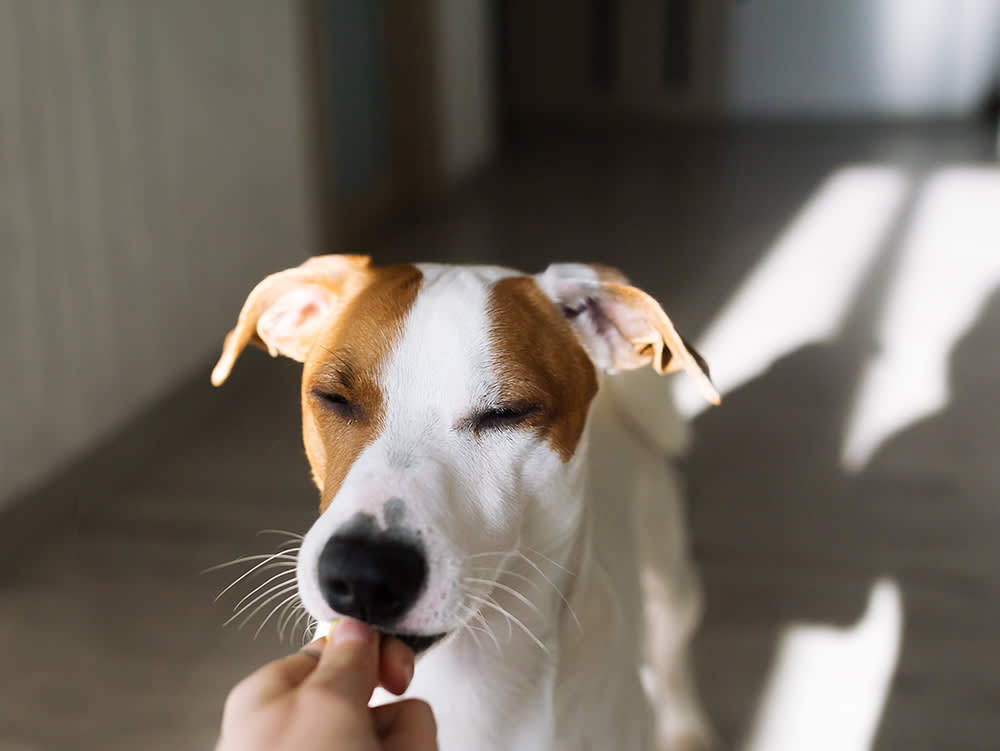
share article

Your pet wants you to read our newsletter. (Then give them a treat.)
Disclaimer alert: This article is here to share information. But, much like pineapple on pizza, the topic may be controversial. Meaning, not all vets or pet professionals agree. Because every pet is a unique weirdo with specific needs. So, don’t take this as fact or medical advice. Talk things over with your vet when making decisions, and use your best judgment (about both your pet’s health and pizza toppings).
If you’re reading this, you’ve likely taken some CBD yourself. (Not a wild guess: One survey found three out of every four shoppers who buy CBD for their pets also use CBD themselves — and millennials make up more than half of all pet CBD purchasers). People use it for stress, anxiety, pain relief, and to help them fall sleep. When it comes to pets, the reasons are a little different.
“These days, CBD is king,” says Dr. Rob Silver, DVM, MS, an integrative veterinarian, consultant to the animal nutraceutical industry, and author. “Arthritis, anxiety, epilepsy, and cancer are the top four uses; then end of life issues.” Pet parents spent $426 million on pet CBD products in 2020 and are expected to spend $629 million by the end of 2021, according to a new report by Brightfield Group, a cannabis and CBD research marketing company. But does all that money being spent on CBD products for pets guarantee the stuff works? Well, that’s still up for debate. We’ll explain...
But First, What Exactly Is CBD?
Cannabidiol (CBD) is one of at least 60 known plant-based cannabinoids, naturally occurring active chemical compounds that act on the brain and body. It’s derived from cannabis, sure, but has no psychoactive effects — it provides “the benefits without the buzz,” as a writer once put it. Over millennia, people have domesticated and cultivated multiple strains of cannabis to use for a variety of reasons. Today, generally speaking, the two you’ll hear the most about are marijuana (a product rather than a plant type), which has more than 0.3% THC, and hemp, legally defined as cannabis plants that contain less than 0.3% of THC. Many CBD products for dogs are sourced from hemp.
Every animal with a spinal column has an endocannabinoid system (ECS), an ancient system — discovered through the work of researchers between roughly 1965 and 1995 — named for Cannabis sativa L., the plant species that most dramatically affects it. Its basic functions have been summarized as to “relax, eat, sleep, forget, and protect.” Research shows that cannabinoid receptors are similar across species, functioning much the same way in dogs as they do in people, although dogs have far more receptors in their brains than any other animal tested (including humans). “Receptors are like locks, and cannabinoids are like keys — they fit together perfectly,” explains Dr. Silver. “Once the cannabinoid connects to the receptor and turns that lock, a series of actions occur in the cell membrane — these actions are responsible for some of the cannabinoid’s effects.”
So, Is CBD Good For My Pet?
That depends. Anecdotal evidence and studies suggest it can help — and, more importantly, can’t hurtopens in a new tab (CBD’s side effects, which are few, include sleepiness and an overactive appetite) — but veterinarians are not of one mind about it. You see, CBD products are not regulated by the FDA so CBD products cannot be labeled as “supplements,” nor can treats containing it be called “food.” This can make navigating product sources and ingredient lists challenging. CBD is legal, though, so you can rest easy there. In 2018, the DEA determined that products excluded from the definition of marijuana in the Controlled Substances Act — including hemp and CBD — “may be sold and distributed throughout the United States without restriction.”
Still, in some states, veterinarians are prohibited from administering, prescribing, or dispensing hemp-based CBD to their patients. While many holistic and integrative vets like Dr. Silver recommend CBD as part of a companion animal’s therapeutic regimen, many also would like to see more scientific research to support the growing body of anecdotal evidence first. Thankfully, this research is now taking place in the U.S. and around the world. So far, studies — some of which are linked to below — have shown promising results in regards to CBD’s effectiveness in reducing or eliminating epileptic seizures, relieving acute and chronic pain and inflammation, anxiety, stress, noise phobias, vomiting, skin, and gastrointestinal problems. There are suggestions that it may also have an anticancer property. And some pet insurance companies will reimburse for the cost of CBD products. All that said, there is still more work to be done.
The rule of thumb is to start at a low dosage and work your way up, factoring in how much your pet weighs. CBD for pets comes in tincture, capsule, or treat form — all of which should have dosage instructions. Also consider why you’re considering CBD for your pet. More acute events, such as a stay at a kennel or a holiday party or following a surgery, may call for higher doses. For chronic conditions, like arthritis pain or end-of-life issues, give the CBD at lower doses, two or three times a day. (Note that some pet products use trendy hemp seed oil — this is not CBD.) Below, we break down common health issues that may make you consider giving your dog or cat some CBD.
What Health Issues Can CBD Potentially Help With?
1. Seizures
Just like people, dogs can suffer from canine epileptic seizures. In fact, the FDA first approved CBD for people with epilepsy, and the successful use of CBD in treating pediatric epilepsy inspired veterinarian researchers to study its effects on dogs. If your dog starts seizing, see a vet ASAP. But if your dog has been diagnosed with canine idiopathic epilepsy and Western medicine isn’t helping, ask your vet about CBD (vets are increasingly comfortable talking about CBDopens in a new tab as part of an epileptic treatment plan — especially vets in states that have legalized recreational marijuana).
While there is medication for dogs with seizures, about one in four dogs do not respond to it. Which is where CBD may help. It has been shown to have anticonvulsant properties, and works by calming overactive neurons, reducing both the frequency and severity of seizures. A 2019 studyopens in a new tab found that a dose of 2.5 grams of CBD per kilogram of body weight, twice daily for 12 weeks (in addition to prescribed epilepsy medication) cut the number of seizures by an additional 33%. The researchers mulled that higher doses of CBD could lead to even better effects.
Last year, the FDA approved Epidiolex, a CBD-based prescription drug for the treatment of hard-to-treat seizures in both children and adults; its effectiveness had been tested in an international randomized, double-blind, placebo-controlled trial. This year, results of a pilot study con- ducted by veterinary neurologist Stephanie McGrath at Colorado State University’s James L. Voss Veterinary Teaching Hospital were published in the June 1 issue of the Journal of the American Veterinary Medical Association; the report noted that 89 percent of the dogs treated with CBD had fewer seizures. (Enrollment in another, larger trial is currently open; contact CSUNeuroTrials@ colostate.edu for more information.)
2. Aggression
If your dog starts posturing when another dog (or stranger) approaches, you may want to try some CBD. CBD has been given to long-haul shelter dogs to help them cope with the rolling heartbreak of being passed over for forever homes. Shelter dogs also suffer from social deprivation, a lack of one-on-one interaction, and a general lack of exercise. In Italy, it’s illegal to euthanize shelter dogs, which led researchers there to see if CBD might have long-term calming effects in particularly aggressive shelter dogs.
It turns out that over the course of the six-week study, the shelter pups who received the CBD indeed showed less aggressionopens in a new tab. Good dogs. And in case you’re wondering, the CBD didn’t make the dogs sleepy, nor decrease their activity levels, which is evidence that it doesn’t dope up dogs — it just has a chilling effect.
3. Itching
Dogs are experts at scratching itches but you can’t resist lending a hand. Do you know what else can help? That’s right, CBD. Kentucky researchers recently gave kennel dogs two different doses of CBD, and they both worked to get the dogs to scratch lessopens in a new tab. That said, Dr. Silver notes, “No one has seen any benefit for dogs who itch on account of allergies — CBD works when dogs itch because they are anxious [like a nervous tick].”
4. Pain
Studies on dogs at leading research universities have shown positive effects of CBD on dogs with joint painopens in a new tab. At Cornell, researchers tried CBD on arthritic dogs and, after a month, they found the dogs signaled less pain — demonstrated by an increase in activity. This is great news because traditional pain medications, NSAIDs, are processed through the liver and have the potential to cause liver and kidney damage if used long-term — especially in immune-compromised and senior pets.
So while they are safe for dogs with short-term injuries, the side effects are too risky for the chronic join pain caused by arthritis, hip dysplasia, and IVDD (herniated discs). Thankfully CBD works wonders for dogs with these conditions owing to its formidable anti-inflammatory effect. One study even found that CBD could slow the progression of osteoarthritisopens in a new tab, a degenerative disease, by curbing the nerve damage caused by inflammation.
5. Stress & Anxiety
Fireworks freak out dogs — everyone knows this. “There’s always a spike in CBD sales around the Fourth of Julyopens in a new tab,” says Dr. Silver. “CBD can help with behavior modification and can be helpful for mild anxiety, such as for kennel stays, when company comes over, and, yes fireworks.” CBD works by activating serotonin receptors to increase levels of anandamide — that’s the “runner’s high” compound in the body. For anxiety, Dr. Silver recommends that pet owners determine if their pets are anxious on an ongoing basis or if the anxiety spikes during special events, such as a natural disasteropens in a new tab. “Begin with a drop or two to find the non-toxic starting dose, then up the dosage closer to the event.”
It’s for this reason that people decide to give their pets CBD when their dog or cat is coming to the end of their life. Countless studies have shown CBD to not only have stress-busting effects, but also therapeutic, anti-depressant effectsopens in a new tab. CBD is therefore a promising answer to separation anxiety in dogsopens in a new tab. If your dog is anxious and/or destructive when you leave them home alone — or you anticipate they will be when you go back to work post-pandemic — then try all-natural CBD before resorting to stronger anti-anxiety medicationsopens in a new tab.
The Best CBD Products for Your Pet

Todd Runestad
Todd Runestad lives in Colorado and has cycled through three sets of two dogs in the last 25 years. He is currently guardian of a cat and four chickens (hey, chickens are pets, too!). He writes about supplements and nutritional ingredients for NewHope.comopens in a new tab and NaturalProductsInsider.comopens in a new tab.
